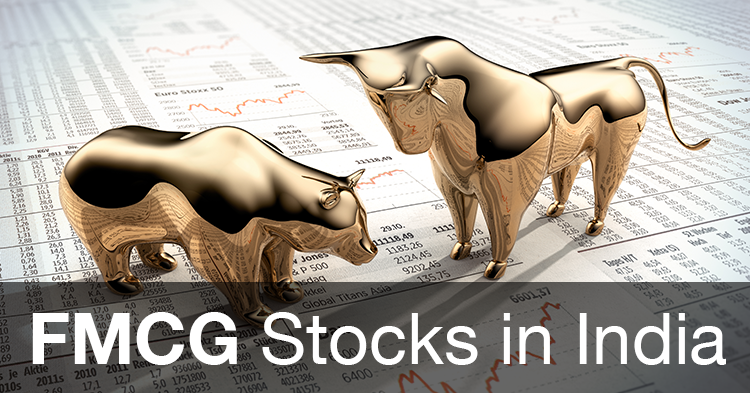
What is FMCG?
Any product or service that is created for the purpose of being used directly by the consumer or end-user is a consumer good. Consumer goods are broadly divided into three categories:
FMCG or ‘Fast-Moving Consumer Goods’ fall under the non-durable goods category. They are sold quickly at a relatively low price. They not only have a low shelf life but also a high turnover rate in stores due to extraordinary demand and being perishable in nature. FMCG includes cosmetic products, perishable food items like fruits and vegetables, over the counter medication, cleaning products, baked goods, toiletries, and office supplies, among other non-durables.
FMCG Stocks in India
Due to their extreme turnover rate, the market of FMCGs in India is both large as well as competitive. FMCGs typically have low-profit margins, but still account for 50% of consumer spending in India. Being the fourth largest sector in the country, FMCG stocks in India can be profitable investments. While there are large, mid and small-cap FMCG companies in India, this article will focus on large-cap FMCG companies. Here is a list of the top FMCG stocks from India.
Incorporated in 1975, Dabur India Private Limited is a large-cap FMCG company whose market capitalization is currently at ₹78,873.73 crores. This manufacturer of ayurvedic and other natural consumer products is one of the leading FMCG companies in India. Popular consumer goods manufactured and sold by Dabur Ltd. include supplements like Dabur Chyawanprash, digestive aids like Pudinhara, and personal care products like Amla hair oil.
Performance: A Price-to-Earnings (P/E) ratio of 58.4 indicates the expectation of high earnings, but what does Dabur’s performance say? While there are ups and downs each week, the long-term pattern shows that Dabur has grown steadily over the last five years. In Jan of 2016, a Dabur share was valued at ₹277, and in Jan of 2020, it is valued at ₹500. This steady upward slope allowed Dabur to perform exceptionally well throughout 2019 at 29% returns even when most of the stock market was underperforming.
Hindustan Unilever of HUL is one of the most valued large-cap FMCG companies in India with a market cap of ₹487,515.68. HUL deals in a host of consumer non-durables like food items, beverages, and personal care products. Most brands you might be familiar with seeing at the supermarket fall under the HUL portfolio. These include Lifebuoy, Lux, Surf Excel, Fair & Lovely, Dove, Lakme, Sunsilk, Closeup, Axe, and Knorr, up to a total of 35 Indian brands.
Performance: While HUL shows ups and downs on a day-to-day basis, even 5 days charts show it performing in the green. Consecutively, monthly, yearly and 5-yearly charts of HUL show how it has been valued more consistently across time. At the start of 2005, a market share in HUL was valued at a meager ₹150. Fifteen years later, today this same market share price has grown to ₹2,250. Finally, an exceptionally high P/E ratio of 71 makes HUL one of the top FMCG stocks to invest in.
Another large-cap conglomerate likened to HUL is Nestle India. Its current market valuation is ₹157646.93 crores. It manufactures food and beverage products under brand names such as Nescafe, Nestea, Maggi, Kit Kat, Milkybar, Bar-One, and Milkmaid, among others.
Performance: With an all-time market high of ₹16,783 in 2020, Nestle stocks seem to be on the rise. In one year alone, share prices for Nestle India have grown by ₹6000 from ₹10,300 in Feb of 2019 to ₹16,345 in Feb of 2020. This growth is more than the market value of shares for Nestle India five years ago which was ₹5600, making it one of the best performing FMCG stocks in India. The P/E ratio of a steep 85.73 reflects this sharp growth.
Operational since 7th Feb 2020, Tata Consumer Products is a revamp of Tata Global Beverages, a large-cap top performer in the FMCG market. Being the world’s second-largest manufacturer of branded tea, this company has a market capitalization of ₹ 25,049.54 crores.
Performance: In 2019, Tata Consumer Products shares returned the most gains among all FMCG stocks. Shares rose by 44.53% YTD, putting Tata Consumer Products in the lead and Nestle India behind it at 31% which was surprising to investors. There was consistent growth in the core business which helped this surge in shares. The P/E ratio today is 61.
Procter & Gamble Hygiene is known to manufacture grooming and personal hygiene products. Brands include Ambi Pur, Duracell, Ariel, Pampers, Tide, Gillette, Olay, Head & Shoulders, Oral-B, Pantene, Vicks, and Whisper. It is a large-cap FMCG company with a market capitalization of ₹ 37,377.24 crores.
Performance: As per bullish expectations, P&G Hygiene and Health has grown by ₹6,200 in 5 years from ₹5700 in Jan of 2016 to ₹11,900 in Jan of 2020. Out of all the companies mentioned it holds the highest P/E ratio of 90.63 indicating high expectations when it comes to future returns and a potential top FMCG stock performance.
Published on: Feb 20, 2020, 9:13 AM IST
We're Live on WhatsApp! Join our channel for market insights & updates
